Awkward: CBO More Than Doubles Estimate of Negative Employment Effect of “ObamaCare”
[UPDATE below.]
At Mises Canada I explain the CBO’s new report that has people guffawing. Note: Please be careful in how you cite their analysis; it’s not really accurate to say, “CBO says ObamaCare will destroy 2 million jobs!” (Don’t get me wrong, it may very well do just that, but my point is, that’s not really what the CBO is saying.)
However, on a related note, someone please reconcile Krugman’s post on the report. As best as I can tell, we now know the following:
(1) In general, unemployment benefits will reduce the incentive to work and will cause less employment. However, any right-winger who tries to use that right now as an argument against unemployment benefits is an idiot throwing out decades of economic theory about liquidity traps, since right now we are deeply enmeshed in a slump where demand-side factors totally swamp supply-side factors.
(2) In general, the incentive structure in the Affordable Care Act will reduce the incentive to work and will cause less employment between now and 2017. If the White House wants to cite that as a great feature of the ACA, that is entirely appropriate. Government intervention has actually screwed up the labor market for decades, and the ACA’s supply-side effects will UPDATE: may correct this inefficiency.
Do I have that right, kids? And if so, am I just being churlish for thinking that’s an odd combination of views?
A School for Keynesians Who Can’t Read Good
…should be established. Yes I am now starting to think there is a “Krugman Derangement Syndrome,” because people seem to have an amazing inability to parse objections thrown his way.
Today’s case in point: Noah Smith, but first I have to give some context:
Ed Prescott (a Nobel laureate) recently gave a quote to a NYT reporter saying, “It is an established scientific fact that monetary policy has had virtually no effect on output and employment in the U.S. since the formation of the Fed.” So of course both Keynesians and Market Monetarists were flipping out, and (assuming that quote is in context) I agree Prescott should have been clearer about what he was saying, since as-is so many economists would dispute it. (My guess is that he meant we all agree money is neutral in the long-run, and that we’ve been doing QE for years now so let’s admit this isn’t working, blah blah blah.)
But that’s not the issue for our post right now. No, the issue is Noah Smith, and how he can’t read good. But we still need more to set up the story:
Chris House was discussing Prescott’s statement about monetary policy and how it was nutty. House’s point was that this shouldn’t surprise us too much, since Nobel laureates are not your normal folks and they are only experts in a narrow field. Then, to illustrate that we shouldn’t be so shocked that Prescott would utter such a ridiculous statement about monetary policy, House offered the throwaway line: “Even Paul Krugman has been known to say some rather nutty things.” As you can imagine, people flipped out about that line too (and probably not the same group of people who had flipped out about Prescott’s line).
Now then we are ready to parse Noah Smith, who chimed in with this:
“Even Paul Krugman has been known to say some rather nutty things at times.”
Chris House was a bit surprised when that statement received considerable pushback. It seems like an innocuous, throwaway line, sort of like when a political writer says “and of course the Democratic party has its extremists too.” A gesture toward centrism.
No Noah, your analogy doesn’t work. You changed the “Even” to “and of course.” Words mean things, and when you change them, you might change the meaning of the sentence.
Here’s what would be analogous if you want to take Chris House’s discussion and make it about political parties:
“Mark Sanford’s continued career in politics shouldn’t shock us, despite his marital infidelity. This is actually common among politicians, who are very charming and hold power. Even Bill Clinton has been known to cheat on his wife.”
So unless that was supposed to be a flat-out joke, then yeah such an absurd statement would indeed be worthy of “considerable pushback.” I don’t know Chris House’s writing style, but from this one post it looked like he was being whimsical at best; his point wasn’t, “Good grief, Krugman is the epitome of a Nobel laureate who says eight crazy things by lunchtime.”
And even if that is what House meant, it’s not how Noah defended him.
Hence, the obvious need for a School for Keynesians Who Can’t Read Good.
My EconLib Article on the Minimum Wage Debate
Learn it, live it, love it. The key graph, with my commentary:
In Figure 1 below, for diagrammatic simplicity, I assume that the initial market-clearing wage for low-skilled labor is $7.25 per hour. At this $7.25 wage rate, two million workers have jobs. Then, the federal government imposes a wage floor of $10.10 per hour. Because the demand for low-skilled labor is (by stipulation) very inelastic, the quantity of labor demanded falls by only 2,000 workers, a negligible drop of 0.1 percent. Economists running regressions on this episode would conclude—correctly—that raising wages by 39 percent had little impact on the absolute level of employment.
However, in our example, the supply curve (by construction) is a more typical shape, such that the large increase in the wage rate leads to a large increase in the number of workers seeking employment—500,000 in our scenario. There is now a significant amount of involuntary unemployment in the market for low-skilled labor; the unemployment rate would skyrocket.4
Even though (by construction) our hypothetical minimum wage has not significantly reduced total employment, it has, nonetheless, drastically impaired the functioning of the labor market. The “glut” of workers on the market means that non-price allocation mechanisms must come into play. Since there are now multiple applicants for a given job opening, employers can rely on other criteria, including racial and class background, to choose which worker gets the job. It is much more likely that an applicant will need to “know somebody” to get hired, and that teenagers from “respectable” backgrounds will be the ones to work at fast food restaurants, displacing teenagers who might be in more desperate circumstances.
I also summarize some of the key issues in the econometric debates, but without declaring an unambiguous victor. My aim was more modest (in this article): I wanted to let the lay person (and indeed other economists) understand how it was possible to be arguing about this, when we supposedly have such a rich data set of minimum wage changes and employment responses.
Court Intellectuals Hit Back at Whistleblowers
I’ve been traveling and just now read the mid-January piece in The New Republic by Sean Wilentz, a history professor at Princeton. The ostensible purpose of the article is to cast doubt on the motives of Edward Snowden, Glenn Greenwald, and Julian Assange, but Wilentz’s hatchet job (and yes I use that term quite consciously) is so absurd that I almost wonder if he actually supports these men and hijacked TNR’s site to bolster their fanbase. The two takeaways from this episode are (1) no matter how open-and-shut the threat of an overreaching government, there will always be court intellectuals to defend it, and (2) Ron Paul is at the center of the opposition to Leviathan.
Wilentz’s piece is long, but I encourage you to read it if only to understand the background of these three men and how they came together in the struggle against the surveillance State. (This is partly why I tongue-in-cheek suggested that Wilentz might secretly be rooting for these guys; I don’t see how anyone could read the piece and end up feeling better about the NSA.) It’s only noteworthy to see just how flimsy Wilentz’s smears (and yes that’s what they are) need to be. For example, check this out:
By 1999, a 16-year-old Snowden had moved with his family from North Carolina to Maryland. He had dropped out of high school in his sophomore year and become enamored with computers. Snowden spent increasingly large swaths of his time on Ars Technica, a technology news and information website for self-described “alpha geeks.” Soon, he was posting regularly in the site’s public chat rooms under the user name “TheTrueHOOHA.” Snowden, it seems, mostly engaged in postadolescent banter about sex and Internet gaming—and occasionally mused about firearms. “I have a Walther P22,” he wrote. “It’s my only gun, but I love it to death.” The Walther P22, a fairly standard handgun, is not especially fearsome, but Snowden’s affection for it hinted at some of his developing affinities.
The tone of the above epitomizes the entire piece. Go ahead and read the whole thing–there are a handful of legitimately surprising bits, like Snowden complaining in January 2009 about the New York Times and wikileaks releasing classified information–but most of it is pure mockery and guilt-by-association. For example, here’s how Wilentz tries to make his readers less trusting of Glenn Greenwald:
It was in his pro bono work that Greenwald discovered his true passion: defending the civil liberties of extremists.
In several cases over a five-year span, Greenwald represented Matthew Hale, the head of the Illinois-based white-supremacist World Church of the Creator, which attracted a small core of violently inclined adherents. In one case, Greenwald defended Hale against charges that he had solicited the murder of a federal judge. Hale was eventually convicted when the federal prosecutor, Patrick Fitzgerald, produced the FBI informant with whom Hale had arranged the killing. Greenwald’s other clients included the neo-Nazi National Alliance, who were implicated in an especially horrible crime. Two white supremacists on Long Island had picked up a pair of unsuspecting Mexican day laborers, lured them into an abandoned warehouse, and then clubbed them with a crowbar and stabbed them repeatedly. The day laborers managed to escape, and when they recovered from their injuries, they sued the National Alliance and other hate groups, alleging that they had inspired the attackers. Greenwald described the suit as a dangerous attempt to suppress free speech by making holders of “unconventional” views liable for the actions of others. His use of a euphemism like “unconventional” to describe white nationalists was troubling, but on First Amendment grounds, he had a strong case and he made it successfully.
Greenwald’s pro bono work is not evidence of anything more than a principled lawyer providing hateful people with constitutionally guaranteed counsel.
You see how this Wilentz operates? He gives salacious details of the hateful people Greenwald defended as a pro bono lawyer, but then assures us he (Wilentz) doesn’t want that to color our opinion of Greenwald in any way. No no, just adding some colorful background; it was either the neo-Nazi clients, or a discussion of Greenwald’s interest in lacrosse. Wilentz probably flipped a coin when picking the topic of that paragraph.
But now Wilentz brings out the big guns: linking Greenwald to that weirdo Ron Paul:
Greenwald had identified a vehicle for a political realignment: the presidential candidacy of the old libertarian warhorse Ron Paul. In November 2007, Greenwald called Paul “as vigilant a defender of America’s constitutional freedoms … as any national figure in some time.” He acknowledged that “there is at least something in Paul’s worldview for most people to strongly dislike, even hate,” and he described Paul as “an anti-abortion extremist” and “near the far end” of the right’s stance on immigration policy. Still, he believed Paul to be a rare truth-teller, prepared to buck a corrupt bipartisan consensus.
This portrayal required highly selective political reasoning, not to mention a basic ignorance of U.S. history. Paul, a longtime supporter of the John Birch Society, is a quintessential paleoconservative, holding prejudices and instincts that predate the post–World War II conservative movement founded by William F. Buckley Jr. and others.
Then of course, Wilentz quotes from the Ron Paul newsletters. This is somehow supposed to prove that Glenn Greenwald has bad judgment and can’t read US history–even though Wilentz himself quotes Greenwald as saying there is something in Paul’s worldview that most people will hate.
So let’s see Prof. Wilentz, there are two hypotheses here: One is that the gay Greenwald (who was a progressive darling in his attacks on the Bush Administration and only turned on Obama once it was clear he was implementing Bush’s third term) really deep down hates traditionally persecuted groups and all this blather about the NSA is a smokescreen, OR he recognizes that the real danger today is the NSA and the rest of the apparatus of the Empire. I mean, it’s almost as if some people think mass murder and systematic torture is more important than mean quotes culled from decades-old newsletters. What are the chances?!
Now why is Wilentz so upset with these three gentlemen? It’s because they are overreacting. Here is how Wilentz–professor of history, so he should know–thinks problems with Big Government get fixed:
Some of the documents stolen by Edward Snowden have revealed worrisome excesses on the part of the NSA. Any responsible whistle-blower, finding evidence of these excesses, might, if thwarted by her or his superiors, bring the evidence of those specific abuses to the attention of the press, causing a scandal, which would prod Congress and the NSA itself to correct or eliminate the offensive program.
But the above isn’t the path that our irresponsible whistleblowers have taken, according to Wilentz. Instead of calmly reporting the abuses, and forcing the government to reform itself, they make all kinds of wild accusations. I don’t want the present post to get too long, so let me close with just two final examples of just how absurd Wilentz’s piece is:
[Snowden, Greenwald, and Assange] want to spin the meaning of the documents they have released to confirm their animating belief that the United States is an imperial power, drunk on its hegemonic ambitions.
According to the leakers’ own evidence, however, this interpretation is simply not the case. The files leaked so far strongly indicate that the U.S. intelligence system, although in need of major reform, is not recklessly spying on its citizens. The President’s Review Group on Intelligence and Communications Technologies found serious problems with the NSA’s data collection, and recommended, among other restrictions, outlawing the NSA’s practice of amassing and storing the phone records of virtually all Americans….
A similar pattern recurs with other supposedly damning documents. Among those cited by The New York Times, in its editorial supporting clemency for Snowden, is one that purportedly proves “the N.S.A. broke federal privacy laws, or exceeded its authority, thousands of times per year, according to the agency’s own internal auditor.” But the Times was drawing on a Washington Post report that failed to say whether the “thousands” of violations amounted to a significant proportion of the total uses of the database, or only a relative handful, within the margin for human error. The Timesalso failed to emphasize that, according to the document, the vast majority those violations, as audited in the first quarter of 2012, were due to simple human or mechanical error and that there was no way of knowing whether the balance involved serious, as opposed to technical, violations of law.
And there you have it, folks. Greenwald et al. would have you believe that there’s this big scary Surveillance State out to get you, that violates its own internal privacy rules thousands of times per year. But Wilentz assures us that the President has recommended that the NSA stop recording information on virtually all Americans’ phone calls, and that for all we know the “thousands” of privacy violations annually are actually a small percentage, when you consider just how much spying is going on.
Is this for real?! I must be a paranoid libertarian.
The Father’s (Mother’s) Love
If you’re a parent, think of how much you love your kid. Your kid knows it intellectually, but doesn’t really have any idea of how much you do, especially since you set the rules. Does this exercise change your opinion of God?
I Hope Nobody Took Brad DeLong’s Betting Advice
(Note for new readers: If this post seems obscure and petty, you must not have been around when this happened.)
Back in February 2009, the new Obama Administration put out an economic outlook that forecast real GDP in 2013 would be 15.6% above the 2008 level. Greg Mankiw was quite skeptical of this forecast, thinking the Administration’s projections were far too optimistic, and brought up what professional economists describe as the “unit root hypothesis” (an econometrics term).
Paul Krugman responded with a blog post titled “Roots of Evil” (obviously combining “unit root” with “the root of all evil”–ha ha that guy’s such a joker), in which he accused Mankiw of “more than a bit of deliberate obtuseness” in Mankiw’s apparent misunderstanding of the nature of the economic slump facing the nation in 2009. Now Krugman’s accusation was totally bogus, since Mankiw in his original post (let alone if one read his actual academic work on the topic) made quite clear that the issue was that we didn’t know when unemployment would return to normal; nobody doubted that there would be strong economic growth if (and when!) millions of people suddenly returned to work. Yet despite misconstruing Mankiw, Krugman–as often happens–was sly enough to make it look like he was merely objecting to the reasons Mankiw gave for doubting the growth forecast; Krugman didn’t actually go on record as saying he believed the forecast. (Furthermore, Krugman was smart enough to ignore Mankiw’s follow-up offer of a bet.)
The same escape hatch is not available to Brad DeLong. In response to Mankiw’s criticism of the Administration forecast, DeLong wrote a post that began with “Sigh.” (italics are DeLong’s) to show how frustrating it was to deal with such idiocy. DeLong explains that because the 2009 economy was depressed due to high unemployment, we could expect higher than average economic growth as the unemployment rate quickly fell over the next two years (during which half of the above-natural unemployment should be erased). Then DeLong–like Krugman–acknowledges that Mankiw knows all of this, and ends his post this way:
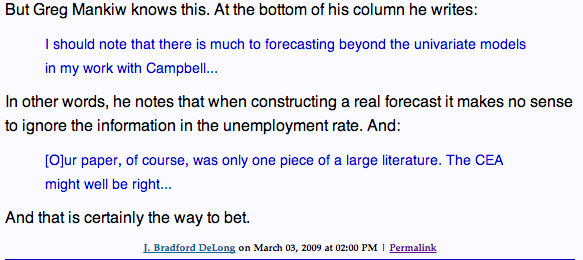
There’s no wiggle room there; DeLong is saying in March 2009 that the people who understand the nature of the recession should bet with the Obama Council of Economic Advisers that real GDP in 2013 will be 15.6% above the 2008 level, and ignore Mankiw’s warning that sometimes recessions linger on and on and on.
So how did things turn out? Scott Sumner reports that “the actual 5 year RGDP growth just came in at slightly under 6.3%. That’s not even close. Mankiw won by a landslide.”
Incidentally, when I went back to re-read DeLong’s commentary on Mankiw, I was greatly amused by the first two comments after his post:
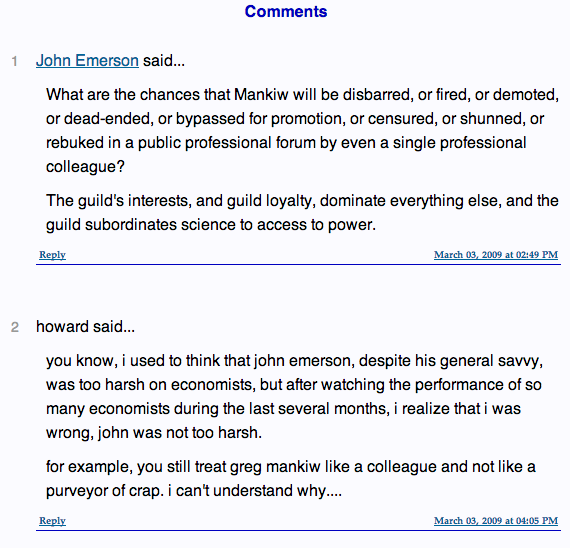
Oh, one last thing: For the defenders of Krugman/DeLong in the comments, please please please don’t say, “They were just saying that once the jobs problem was fixed, economic growth would be above-trend. Of course they knew unemployment might remain high for years; don’t you read their blogs?!” This was Mankiw’s whole point. One might almost say their reaction to him involved…deliberate obtuseness.
Hidden in Plain Sight?
The world’s most wanted whistleblower isn’t in Russia. That’s just what he wants you to think.
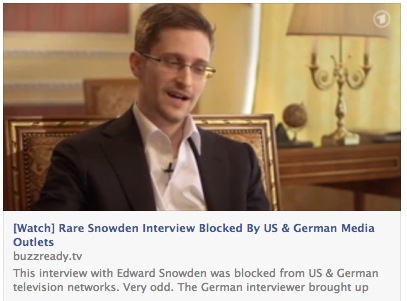
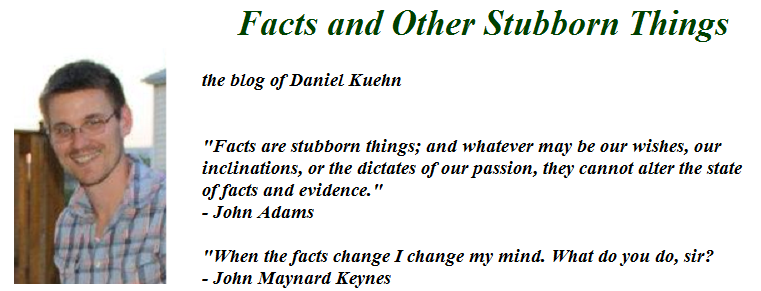
Further Thoughts on Schiff on the Daily Show
Here at Mises Canada. Note, apparently they fixed their supply & demand graph in the video.
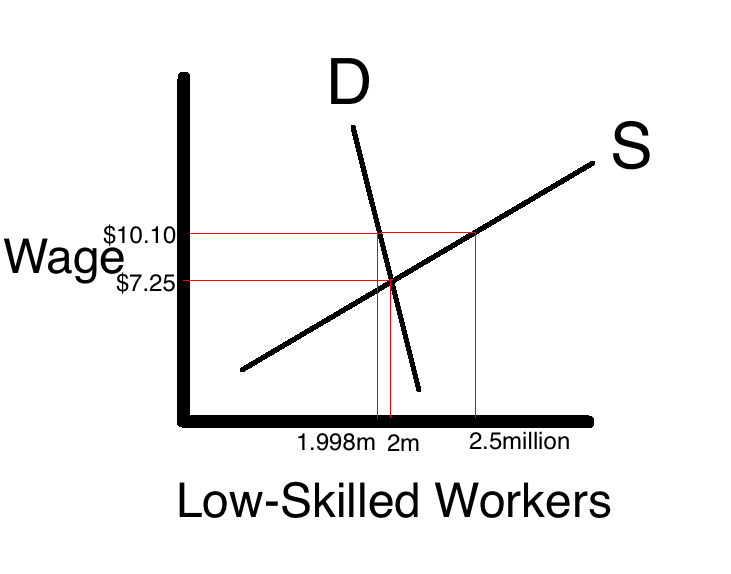







Recent Comments